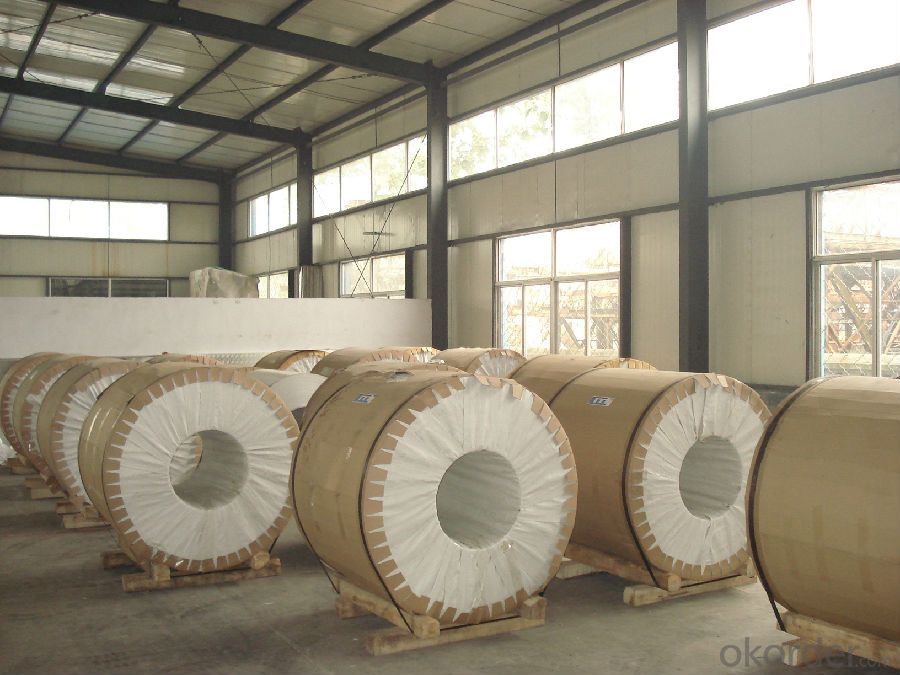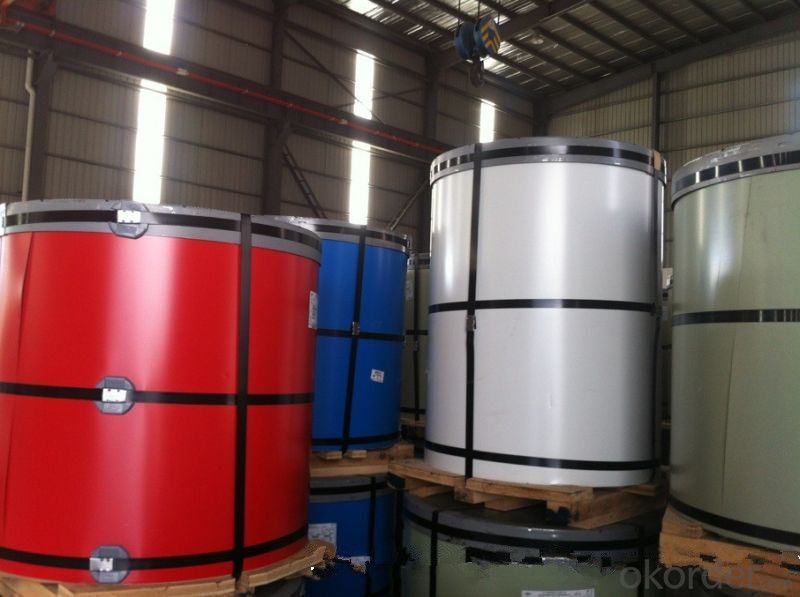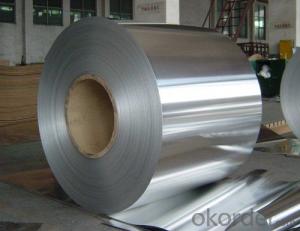PVDF Coated Aluminium Sheet For Solar Panels
- Loading Port:
- Shanghai
- Payment Terms:
- TT OR LC
- Min Order Qty:
- 1 m.t.
- Supply Capability:
- 60000 m.t./month
OKorder Service Pledge
OKorder Financial Service
You Might Also Like
Item specifice
PVDF Coated Aluminium Roll For Solar Panels
Specifications
Standard | GB/T3190-2008, GB/T3880-2006, ASTM B209, JIS H4000-2006 .etc |
Thickness | 0.2-8.0 mm aluminium 7075 t6 |
Width | 1250mm 1000mm 1219mm or as your requirements |
MOQ | 8 Ton |
Package | Standard export package, by wooden box or as required. |
Application | 1060 is widely used in the strength requirements of the product. Products commonly used in signs, billboards, building exterior decoration, bus body, high factory wall decoration, kitchen sink, lamp, fan, electronic components, chemical apparatus, sheet processing, deep drawing or spinning hollow ware, welding parts, heat exchangers, Bell surface and plate, plates, kitchen utensils, accessories, safety equipment and other. |
Characteristics
1) Excellent weather-proof durability
2) Anti-ultraviolet
3) High erosion resistance
4) Stable color and gloss
5) Good mechanical processing performance
6) Abrasion resistance
7) Anti-impact
8) High flexibility
Coating varieties
Polyester Coatings (PE)
PE (polyester) coatings exhibit an excellent combination of hardness, flexibility, flow, appearance, and superior resistance to dirt retention in indoor and outdoor applications. These coatings are highly resistant to abrasion, metal marking, staining, and marring, and require minimal maintenance. Glazetech uses polyester paints which provide excellent colour and gloss retention properties.
Polyvinylidene Fluoride Coatings (PVDF)
PVDF (polyvinylidene fluoride) is a chemical resistant thick film barrier coating commonly used in architectural applications where both excellent appearance and substrate protection must be maintained over a long period of time. This coating is unaffected by most chemicals and solvents and has excellent wear and abrasion resistance. PVDF also has a high dielectric strength, excellent resistance to weathering and the ability to self extinguish.


- Q:What are the tensile strength properties of aluminum coils?
- The tensile strength properties of aluminum coils can vary depending on the specific alloy and temper of the aluminum. Generally, aluminum has a good tensile strength, ranging from 70 to 700 MPa (megapascals). The specific tensile strength of aluminum coils can be determined through material testing and analysis.
- Q:How are aluminum coils used in the production of sporting goods?
- Aluminum coils play a vital role in the production of sporting goods due to their lightweight, durable, and corrosion-resistant properties. These coils are primarily used in the manufacturing of sporting equipment such as baseball bats, tennis rackets, golf clubs, and bicycle frames. One of the key advantages of aluminum coils is their lightweight nature, which allows for enhanced maneuverability and improved performance. For instance, in the production of baseball bats, aluminum coils are used to create hollowed-out barrels that provide players with a better swing speed and increased power. Similarly, in tennis rackets and golf clubs, aluminum coils are utilized to construct the shaft, offering players greater control and maneuverability during gameplay. The durability of aluminum coils ensures that the sporting goods can withstand the rigors of intense physical activities. Whether it is the impact of a baseball hitting a bat or the force exerted on a bicycle frame during a rough ride, aluminum coils provide the necessary strength and resilience to withstand such pressures. This durability factor is crucial in ensuring the longevity of the sporting goods, reducing the need for frequent repairs or replacements. Furthermore, the corrosion-resistant properties of aluminum make it an ideal material for sporting equipment that may be exposed to various weather conditions or moisture. Aluminum coils are resistant to rust, ensuring that the sporting goods can maintain their performance and appearance over time. This quality is particularly beneficial in outdoor sports like golf or cycling, where exposure to rain, humidity, or perspiration is common. In summary, aluminum coils are extensively used in the production of sporting goods due to their lightweight, durable, and corrosion-resistant properties. These coils contribute to the overall performance, strength, and longevity of sporting equipment, enhancing the experience of athletes and enthusiasts alike.
- Q:Can aluminum coils be used in the production of aluminum honeycomb panels?
- Yes, aluminum coils can be used in the production of aluminum honeycomb panels. Aluminum coils are commonly used as the primary material for making aluminum honeycomb panels. The coils are typically processed and shaped into thin sheets or layers, which are then bonded together with an adhesive to form the honeycomb structure. This lightweight and durable structure makes it ideal for various applications, such as aerospace, construction, and transportation industries.
- Q:How are aluminum coils tested for quality assurance?
- Aluminum coils are tested for quality assurance through various methods and parameters to ensure their compliance with industry standards and customer requirements. One of the most common tests performed on aluminum coils is the dimensional inspection, where the dimensions and tolerances of the coils are measured and compared with the specifications. This ensures that the coils are manufactured within the required size and shape. Another important aspect of quality assurance testing is the evaluation of the mechanical properties of the aluminum coils. This includes tests such as tensile strength, yield strength, elongation, and hardness. These tests determine the strength and durability of the coils, ensuring that they can withstand the intended applications and environments. To assess the surface quality of the aluminum coils, visual inspection and non-destructive testing methods are employed. Visual inspection involves examining the coils for any visual defects, such as scratches, dents, or surface irregularities. Non-destructive testing techniques, such as ultrasonic testing or eddy current testing, are used to detect any hidden defects or flaws within the coils. Furthermore, chemical analysis is conducted to determine the composition and purity of the aluminum coils. This is vital to ensure that the coils meet the required chemical composition standards, as impurities can affect their performance and integrity. Additionally, corrosion resistance testing is performed to evaluate the ability of the aluminum coils to withstand corrosion in different environments. This is crucial, especially for applications where the coils will be exposed to harsh conditions or corrosive substances. Overall, the quality assurance testing of aluminum coils involves a combination of physical, mechanical, visual, and chemical evaluations. These tests are conducted at different stages of the manufacturing process to ensure that the coils meet the highest quality standards and provide reliable performance in their intended applications.
- Q:How are aluminum coils packaged for transportation?
- Aluminum coils are typically packaged for transportation in a way that ensures their safety and prevents damage. The packaging process involves several steps to ensure that the coils are well-protected during handling, storage, and shipping. Firstly, the aluminum coils are usually wrapped in a protective material such as plastic or paper to safeguard them from dust, moisture, and other external factors. This wrapping helps to maintain the quality and integrity of the coils throughout the transportation process. After wrapping, the coils are then placed onto a pallet or wooden skid. This allows for easy handling with forklifts or other machinery during loading and unloading. The coils are securely strapped to the pallet to prevent any movement or shifting during transportation, minimizing the risk of damage. To provide additional protection, the coils may be placed inside a wooden or metal crate. This crate acts as a further barrier against potential impacts or rough handling that may occur during transit. The crates are carefully designed to fit the size and shape of the aluminum coils, ensuring a snug fit and preventing any unnecessary movement. Furthermore, depending on the specific requirements and distance of transportation, the coils may also be packed inside a shipping container. This offers an additional layer of protection against external elements and provides stability during long-distance transportation. Overall, the packaging process for aluminum coils prioritizes their safety and protection during transportation. The use of protective wrapping, pallets, crates, and shipping containers ensures that the coils arrive at their destination in optimal condition, ready for further processing or usage.
- Q:Can aluminum coils be customized in terms of thickness?
- Yes, aluminum coils can be customized in terms of thickness. The thickness of aluminum coils can be modified through various manufacturing processes to meet specific requirements and applications.
- Q:Can aluminum coils be used in curtain wall systems?
- Curtain wall systems can indeed incorporate aluminum coils. The lightweight property, durability, and resistance to corrosion make aluminum a favored material for curtain walls. Shaping and forming aluminum coils is a simple task, enabling the creation of desired profiles for these systems. Moreover, aluminum offers a broad spectrum of colors and finishes, allowing for customization and design adaptability. The utilization of aluminum coils in curtain wall systems also presents energy efficiency advantages, thanks to the commendable thermal conductivity properties of aluminum. In summary, aluminum coils are a fitting and widely employed material for constructing curtain wall systems.
- Q:How do aluminum coils contribute to sustainable and green building practices?
- Aluminum coils contribute to sustainable and green building practices in several ways. Firstly, aluminum is a highly recyclable material, allowing for the reuse of aluminum coils in various applications, reducing waste and conserving natural resources. Additionally, aluminum is lightweight, which reduces transportation energy and costs during installation. Furthermore, aluminum coils have exceptional durability and corrosion resistance, resulting in longer lifespan and reduced maintenance needs. This longevity contributes to the overall sustainability of buildings, as they require fewer replacements and repairs. Lastly, aluminum is an energy-efficient material, as it has excellent thermal conductivity, allowing for better insulation and reduced energy consumption for heating and cooling purposes. Overall, the use of aluminum coils promotes sustainability, resource conservation, energy efficiency, and reduced environmental impact in green building practices.
- Q:Can aluminum coils be used for decorative purposes?
- Yes, aluminum coils can be used for decorative purposes. They are commonly used in various decorative applications such as trim work, wall panels, ceilings, and decorative accents. Aluminum coils offer versatility in terms of color, texture, and finish, allowing for creative and aesthetically pleasing designs.
- Q:I am looking for a good comparison between carbon fiber and aluminum, we presently use aluminum in a lot of our manufacturing and may want to use cf. Does anyone have a simple breakdown of rough cost difference, weight savings, sheet thickness for a certain strength, that kind of thing, kind of struck-out looking on google unless I wanted a bike...Thanks in advance.
- I would like to add to Steel Head's statement that fiber abrasion can also have very negative effects. When aluminum abrades it becomes a lubricant.
1. Manufacturer Overview |
|
|---|---|
| Location | |
| Year Established | |
| Annual Output Value | |
| Main Markets | |
| Company Certifications | |
2. Manufacturer Certificates |
|
|---|---|
| a) Certification Name | |
| Range | |
| Reference | |
| Validity Period | |
3. Manufacturer Capability |
|
|---|---|
| a)Trade Capacity | |
| Nearest Port | |
| Export Percentage | |
| No.of Employees in Trade Department | |
| Language Spoken: | |
| b)Factory Information | |
| Factory Size: | |
| No. of Production Lines | |
| Contract Manufacturing | |
| Product Price Range | |
Send your message to us
PVDF Coated Aluminium Sheet For Solar Panels
- Loading Port:
- Shanghai
- Payment Terms:
- TT OR LC
- Min Order Qty:
- 1 m.t.
- Supply Capability:
- 60000 m.t./month
OKorder Service Pledge
OKorder Financial Service
Similar products
New products
Hot products
Related keywords




























